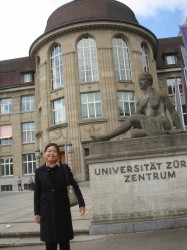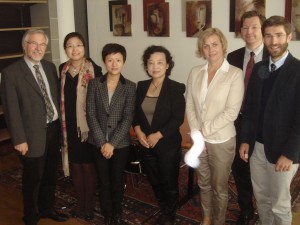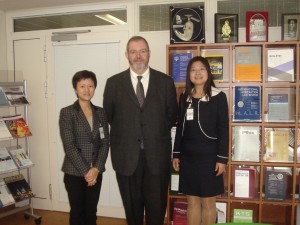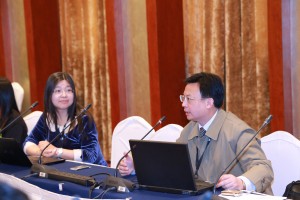 The Second Asia Pacific Internet Leadership Project (APILP), on 12 March 2014 in Beijing, was hailed by the Chinese domain name industry. Since the first APILP succeeded in Beijing 3 years ago, there have always been strong calls for the resurrection of this unique and innovative capacity building project on Internet Governance from both local and AP regional Internet community. The 2nd APILP is a Pilot before the Official Relaunch in Singapore.
The Second Asia Pacific Internet Leadership Project (APILP), on 12 March 2014 in Beijing, was hailed by the Chinese domain name industry. Since the first APILP succeeded in Beijing 3 years ago, there have always been strong calls for the resurrection of this unique and innovative capacity building project on Internet Governance from both local and AP regional Internet community. The 2nd APILP is a Pilot before the Official Relaunch in Singapore.
Beijing Pilot acquired very strong community support. It was supported, especially, by ICANN Asia-Pacific Hub, Asia Domain Names Dispute Resultion Center (ADNDRC), Chinese International Economic and Trade Arbitration Commission (CIETAC) and China Trademark Association, all of which sent the officers to give keynote speeches at the event. As a free and open event, it attracted more than 60 participants from new gTLD applicants, registrars, ccTLD and electronic commerce businesses. Beijing Normal University Institute for Internet Policy & Law (IIPL) and Internet Domain Name System Beijing Engineering Research Center (ZDNS) sponsored the program by providing in-kind donations for meeting room, facilitates, conference materials and participants’ work lunch.
Beijing Pilot featured the theme of “New gTLD Policy & Law” and had 3 theme fora on “Right Protection Measures”, “Dispute Resolution Services” and “Domain Name Registration Policies” respectively. The whole program tremendously interested the Chinese domain name industry. It is worth noting that there has been academic and civil society participation in ICANN through either At Large and NCUC for some years but there has no Chinese participants in the GNSO Commercial, Registry and Registrar stakeholders group, in which there are even hardly any active members from the AP developing world except for a few elites. These policy-making process is dominated almost entirely by US and European business interests, and has been run by essentially the same people almost since the beginning of ICANN. It was raised at the event that Chinese new gTLD applicants, either Brand, community or open TLDs, would hardly be able to catch up with the policies constantly deriving from ICANN mytrix, albeit exert any influence in the policy development process. Capacity building for these new stakeholders are definitely needed. It is good that ICANN Singapore Hub takes APILP as a important vehicle for community services and regional strategy and sent Mr. Kuek, ICANN VP, to open the event in Beijing. More discussions will continue in Singapore at the Launch.
Prof. Xue, at her keynote speech, gave an overview of the various right program measures in new gTLD program and specifically analyzed Sunrise Registrations and Trademark Claims. Prof. Xue pointed out both the usage and limits of the ICANN-accredited Trademark Clearinghouse in design. Submission of trademark information into the Clearinghouse is a prerequisite for any sunrise registration application but does not suffice or guarantee any actual registration under a specific TLD. It is subject to each TLD registry to decide the registration conditions (on geographic, class of goods, trademark registration dates, etc.) and other eligible requirements. Many brand owners concerned that they received misleading information that their brands would get sunrise registration for sure once submitted to the Clearinghouse. The comments from the community only reaffirm the necessity for such capacity building program.

Agenda
09:00~09:30 Registration
09:30~10:40 Opening Ceremony
09:30~09:35 Introduction: Prof. Dr. Hong Xue, Director of BNU Institute for Internet Policy & Law
09:35~09:40 Welcoming Speech: Mr. Yu-Chuang Kuek, Vice-President, ICANN
09:40~09:45 Welcoming Speech: Dr. Wei Mao, Director General of ZDNS
09:45~09:50 Welcoming Speech: Mr. Dennis Cai, Secretary General, Asia Domain Names Dispute Resolution Center
9:50 – 10:30 Release of the New gTLDs Development Report 2014: Mr Xing Zhijie, Director of ZDNS
10:30~12:00 Forum One:Trademark Protection Measures and Related Services
10:30~10:50 Keynote Speech “3rd Revision of Chinese Trademark Law- key issues”: Ms. Xiao Yun, Deputy Secretary General, China Trademark Association
10:50 – 11:10 Keynote Speech “Online Dispute Resolution for Domain Name System”: Dr. Li Hu, Deputy Secretary General, China International Economic and Trade Arbitration Commission
11:10~11:30 Keynote Speech “Right Protection Measures in New gTLD Program”: Prof. Dr. Hong Xue, Director of BNU Institute for Internet Policy & Law
11:30~12:00 Discussion and Q&A
Panelists: Citic Group Management Information Department (.CITIC); Ching Chao, Zhongyu International
12:00 Lunch sponsored by ZDNS
13:30~15:00 Forum Two: Dispute Resolution Services
13:30~14:00 Keynote Speech “URS and Other DRPs Services by ADNDRC”: Mr. Dennis Cai, Secretary General, Asia Domain Names Dispute Resolution Center
14:00~15:00 Discussion and Q&A
Panelists: Prof. Dr. Hong Xue, Director of BNU Institute for Internet Policy & Law; Cui Xinmin, CIETAC
15:00~16:30 Forum Three: Domain Name Registration and Management Policies
15:00~15:30 Keynote Speech “Reshaping and Redefining Whois System”: Mr. Song Zheng, Director of ICANN Beijing Engagement Center
15:30~16:30 Discussion and Q&A
Panelists: Prof. Dr. Hong Xue, Director of BNU Institute for Internet Policy & Law; Yan Rui, CNNIC; Alan Tan, Zodiac; Walter Wu, Springboard
16:30 – 16:40 Closing Remarks

 The workshop on IPRs in mobile internet, on 18th July 2014, was hosted by the Institute for Internet Policy& Law of BNU. Professor Xue Hong, Director of the BNU Institute for Internet Policy& Law, moderated the event and Professor Jorge Contreras from Washington Law School of America University, Sunil Abraham, Director of India Center of Internet and Society (CIS), Nehaa Chaudhari, the Senior Researcher of CIS, and the other researchers joined the workshop in person or remotely and gave the presentations.
The workshop on IPRs in mobile internet, on 18th July 2014, was hosted by the Institute for Internet Policy& Law of BNU. Professor Xue Hong, Director of the BNU Institute for Internet Policy& Law, moderated the event and Professor Jorge Contreras from Washington Law School of America University, Sunil Abraham, Director of India Center of Internet and Society (CIS), Nehaa Chaudhari, the Senior Researcher of CIS, and the other researchers joined the workshop in person or remotely and gave the presentations.







